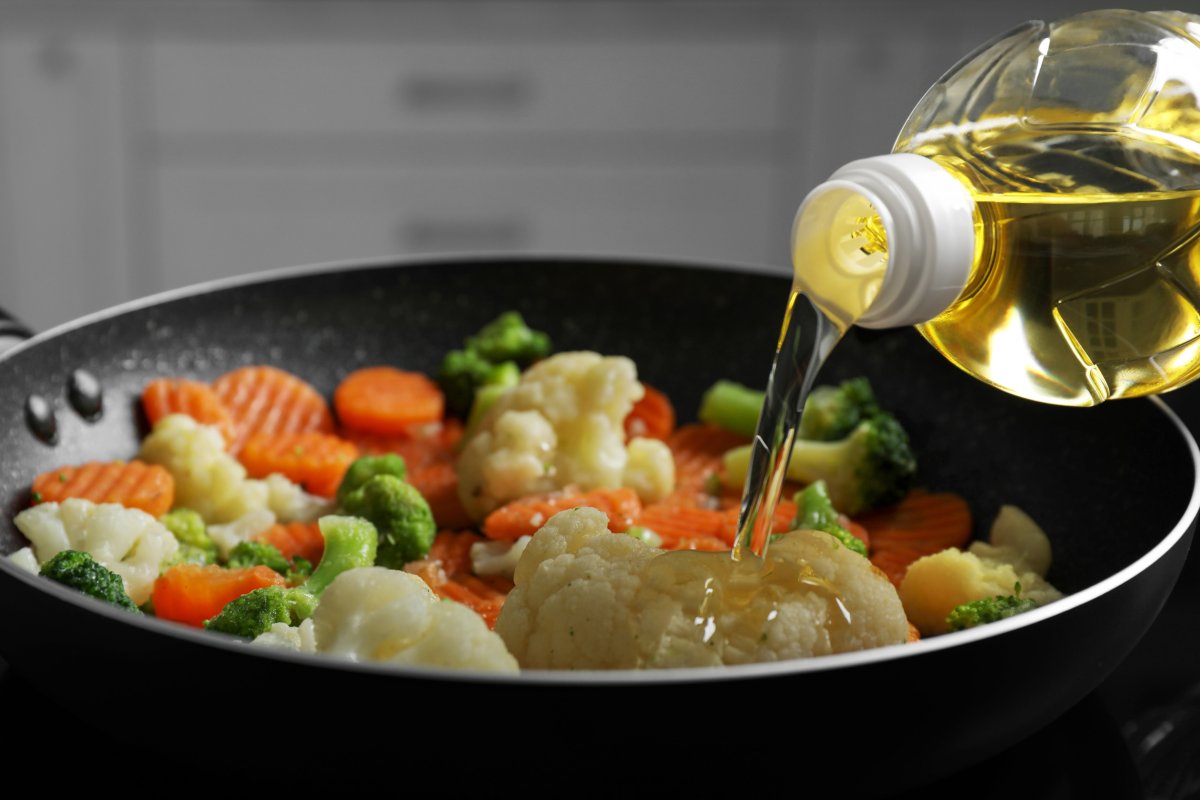Cooking certain vegetables in oils at high temperatures can create unhealthy fats linked to heart disease risk, according to a new study.
The exact relationship between unhealthy fats and heart disease is debated among scientists and nutrition experts, but they agree that one type of fat is unhealthy: trans-fat.
Trans fat is often created when manufacturers make ultra-processed foods, such as margarine, potato chips, frozen pizza and store-bought baked goods such as cookies, cakes and donuts.
This process involves adding hydrogen to unsaturated fats—which are liquid at room temperature, such as vegetable oil—to make trans-fat, which is shelf-stable and solid and room temperature.
Eating a lot of trans-fat can raise levels of LDL (known as “bad”) cholesterol and lower levels of HDL (known as “good”) cholesterol in your blood, so the American Heart Association recommends that Americans limit the amount of trans fat that they eat to reduce their risk of heart disease.
Heart disease is the leading cause of death in the U.S., according to the Centers for Disease Control and Prevention, causing 1 in 5 deaths in 2022 and causing one death every 33 seconds.
But new research from Japan suggests that it is not just ultra-processed foods that might be a problem for trans-fat in the diet.

Vegetable oil is poured over assorted vegetables, including cauliflower, broccoli and carrots. Unsaturated fat is liquid at room temperature and includes canola, rapeseed, grapeseed, soybean, sunflower and vegetable oil.
Liudmila Chernetska/iStock / Getty Images Plus
A study by food scientists at Meijo University found that cooking certain vegetables in vegetable oils at high temperatures can encourage the oils to become trans-fat.
In particular, they found this occurred to when garlic, onion and leek were cooked in unsaturated fats, such as olive oil, at temperatures above 285°F.
Brassica vegetables, such as broccoli, cauliflower, brussels sprouts and cabbage, could also promote this process, called trans-isomerization: when healthy unsaturated fatty acids (UFAs) turn into unhealthy trans fatty acids (TFAs).
The scientists concluded that this was because these vegetables were high in natural sulfur compounds.
“We were interested in the effects of temperature, reaction time, sulfur compound concentration, the type of sulfur compounds and addition of antioxidants on UFA isomerization,” said Juni Obi, first author of the paper from Nissui Corporation, in a statement.
Specifically, the scientists found that sulfur-rich compounds in certain vegetables, namely isothiocyanates—found in brassicas such as broccoli and cabbage—and polysulfide—found in garlic, onion and leeks—could generate trans fats at high temperatures.
However, adding antioxidants—anti-inflammatory compounds, such as vitamin E—to the isothiocyanate vegetables could disrupt this process.
“Release of TFAs under normal cooking conditions is expected to be minimal,” said Dr. Masaki Hondo, corresponding author of the paper from Meijo University, in a statement. “There for, excessive caution is unnecessary.
“However, it is important to understand that cooking with ingredients rich in natural sulfur compounds may increase the risk of TFA intake.”
In other words, even though trans-fats were created, they were still a much smaller fraction of the fats that would be the case in processed foods, and nothing to worry about for most people.
But for those at risk of heart disease already, it might be beneficial to cook these vegetables at lower temperatures to help reduce trans-fat in the diet.
This paper was published in scientific journal Food Research International.
Do you have a tip on a food story that Newsweek should be covering? Is there a nutrition concern that’s worrying you? Let us know via [email protected]. We can ask experts for advice, and your story could be featured in Newsweek.
Reference
Obi, J., Sakamoto, T., Furihata, K., Sato, S., Honda, M. (2024). Vegetables containing sulfur compounds promote trans-isomerization of unsaturated fatty acids in triacylglycerols during the cooking process, Food Research International, 200(115425). https://doi.org/10.1016/j.foodres.2024.115425
